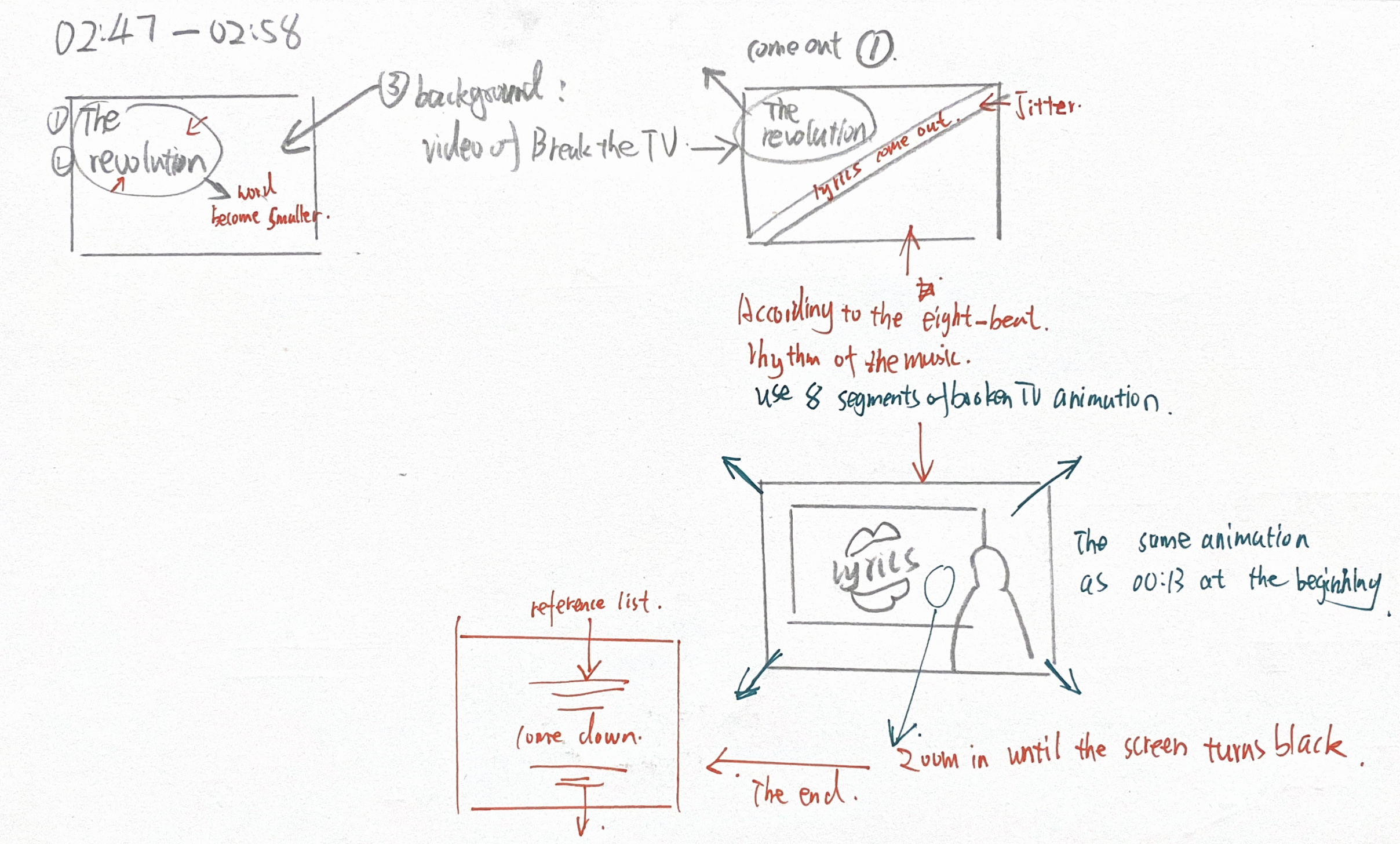Project 2: The revolution will not be televised
Background
The topics covered include the superficiality of television and mass consumerism, the hypocrisy of some potential black revolutionaries, and the white middle class’s ignorance of the difficulties faced by inner city residents.
The 1960s was a decade of hope, change, dissatisfaction, and war, that witnessed many important shifts in American culture.
Against the Vietnam War, the black human rights movement, women demand equality, Kennedy was assassinated
Jill advises in this song that you must be active, you must not be a passive participant in the revolution. When the revolution happens, you must be on the street. If you want to make a change in society, you have to put down your ass and take action You can’t sit on the sofa and watch TV. Advice
According to Gilscott Herron, the revolution will not be decided by the government or the company. To illustrate this point, he laughed at various government officials: “The revolution will not show you Nixon’s pictures/ Blow the horn and lead John Mitchell, General Abrams and Spiro Agnew to eat/ Pork belly confiscated from Harlem Reserve
Music style
This song features a musical fusion of jazz, blues, and soul music, as well as lyrical content about social and political issues at the time. It is presented by Scott-Heron in a rap and beautiful vocal style. He calls himself “bluesologist”, which he defines as “a scientist who pays attention to the origin of blues.” His poem “Revolution will not be televised” is presented in the form of jazz/soul beats and is believed to have had a significant impact on hip-hop music. He recited the lyrics, accompanied by conga and bongo drums.
Poetry keywords and meaning
- “Pigs”, slang term for police[6]
- Xerox, best-known manufacturer (at the time of the poem’s writing) of photocopying machines
- Richard Nixon, 37th president of the United States
- John N. Mitchell, U.S. Attorney General under Nixon
- General Creighton Abrams, one of the commanders of military operations in Southeast Asia during the Vietnam War
- Mendel Rivers, chairman of the House Armed Services Committee during the period of the Vietnam War (Rivers’ name appears in the original 1970 recording, but not in the re-recorded 1971 version, being replaced by Spiro Agnew)
- Spiro Agnew, 39th vice president of the United States under Nixon
- “Hog maws“, sometimes misheard as “hog moss”, soul food made from the stomach of a pig
- Schaefer Award Theatre, an anthology of theatrical films that aired on several U.S. TV stations
- Natalie Wood, film actress
- Steve McQueen, film actor
- Bullwinkle, cartoon character
- Julia, a TV half-hour sitcom series starring Diahann Carroll.
- “Give your mouth sex appeal”, from Ultra Brite toothpaste advertising[7]
- “The revolution will not get rid of the nubs”, the nubs being beard stubble, from a Gillette Techmatic razor advertisement of the period
- Willie Mays, baseball player
- “NBC will not be able to predict the winner at 8:32″, a reference to television networks predicting the winner of presidential elections shortly after the polls close at 8 pm.
- Whitney Young, civil rights leader
- Roy Wilkins, executive director of the NAACP
- Watts, a neighborhood in Los Angeles, alluding to the Watts Riots of 1965
- “Red, black, and green”, the colors of the Pan-African flag
- Green Acres, a U.S. television sitcom
- The Beverly Hillbillies, a U.S. television sitcom
- “Hooterville Junction” (a corruption of Petticoat Junction, a U.S. television sitcom, and its fictitious location)
- Dick and Jane, white children, a brother and sister, featured in American basal readers
- Search for Tomorrow, a popular U.S. television soap opera
- The Brighter Day, another U.S. television soap opera
- “Hairy-armed women liberationists”, participants in second-wave feminism[8]
- Jackie Onassis, the late U.S. President John F. Kennedy‘s widow, seen during the period in television broadcasts of Kennedy memorials
- Jim Webb, U.S. composer
- Francis Scott Key, lyricist of “The Star-Spangled Banner“
- Glen Campbell, U.S. pop/country music singer, then hosting The Glen Campbell Goodtime Hour
- Tom Jones, Welsh pop music singer, then hosting This Is Tom Jones
- Johnny Cash, U.S. country music singer, then hosting The Johnny Cash Show
- Engelbert Humperdinck, British pop music singer, then hosting The Engelbert Humperdinck Show
- Rare Earth, all-white U.S. pop music band signed to Motown Records (this band is only referred to in the 1971 version)
- “White tornado”, advertising slogan for Ajax cleanser, “Ajax cleans like a white tornado”
- “White lightning”, a slang term for moonshine, the name of a 1950s country and western song by George Jones, and an American psychedelic rock band.
- “Dove in your bedroom”, an advertising image associated with Dove anti-perspirant deodorant
- Reference to “Put a tiger in your tank”, an Esso (now Exxon) advertising slogan created by Chicago copywriter Emery Smith
- “Giant in your toilet bowl,” a reference to Liquid-Plumr commercials saying that it cleared so well it was like “having a giant in your toilet bowl” with an animation of a large arm using a plunger on your toilet.
- Reference to “Things go better with Coke”, a Coca-Cola advertising slogan
- Reference to “Fights germs that may cause bad breath”, from Listerine advertising
- Reference to “Let Hertz put you in the driver’s seat”, advertising slogan for Hertz car rental[9][10]
BRAIN STORM
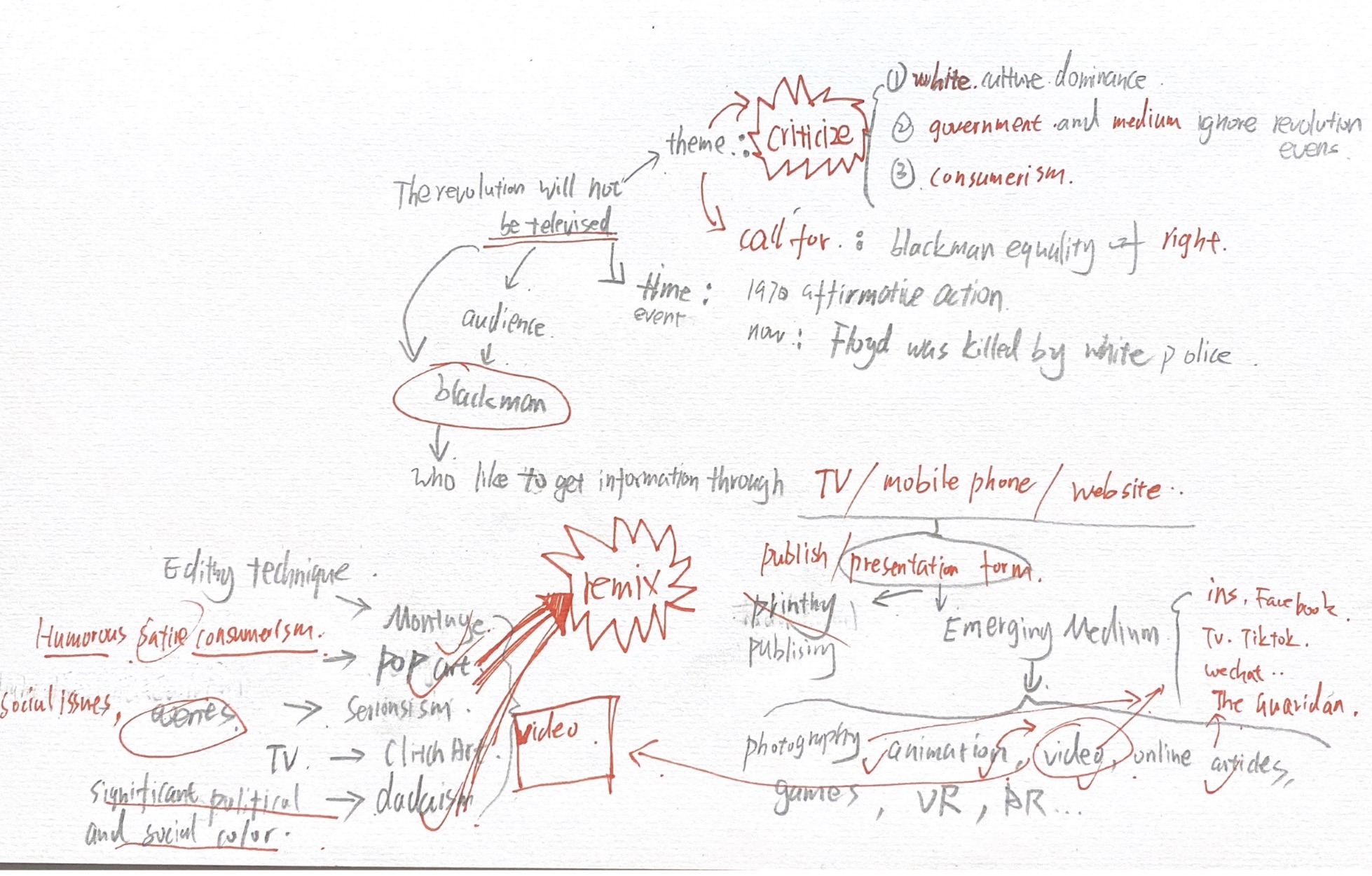
Publication format: The poem is aimed at contemporary black netizens and TV viewers, so I decided to use video as the publishing format. Because short videos, namely short videos, are a very popular way of disseminating Internet content in the contemporary era; with the popularization of mobile terminals and the speeding up of the Internet, short, fast, and high-volume dissemination content gradually gains the favor of major platforms, fans and capital, and it is easy to get the attention of blacks.
The color of the video is black: black represents the serious tone of the black human rights political theme.
Art style: post-modern art: pop, collage art, remix. The writing style of poetry authors is satirical and critical, while the Pop style was born out of radical and humorous satire and villain consumerism and social politics by artists. I remix some of the video materials of entertainment and political news with abstract techniques to express the story that the author wants to tell us.
visual design
First paragraph
You will not be able to lose yourself on skag and
skip out for beer during commercials,
Because the revolution will not be televised.

- “Plug in, turn on, and cop out“, a reference to Timothy Leary‘s pro-LSD phrase “Turn on, tune in, drop out.”[4]
- The scientific legitimacy and ethics of Leary’s research have been questioned by other Kazakh Buddhist practitioners because he took psychedelic drugs with the research subjects and forced students to join. Most people heard of psychedelics for the first time after the Harvard scandal.10]
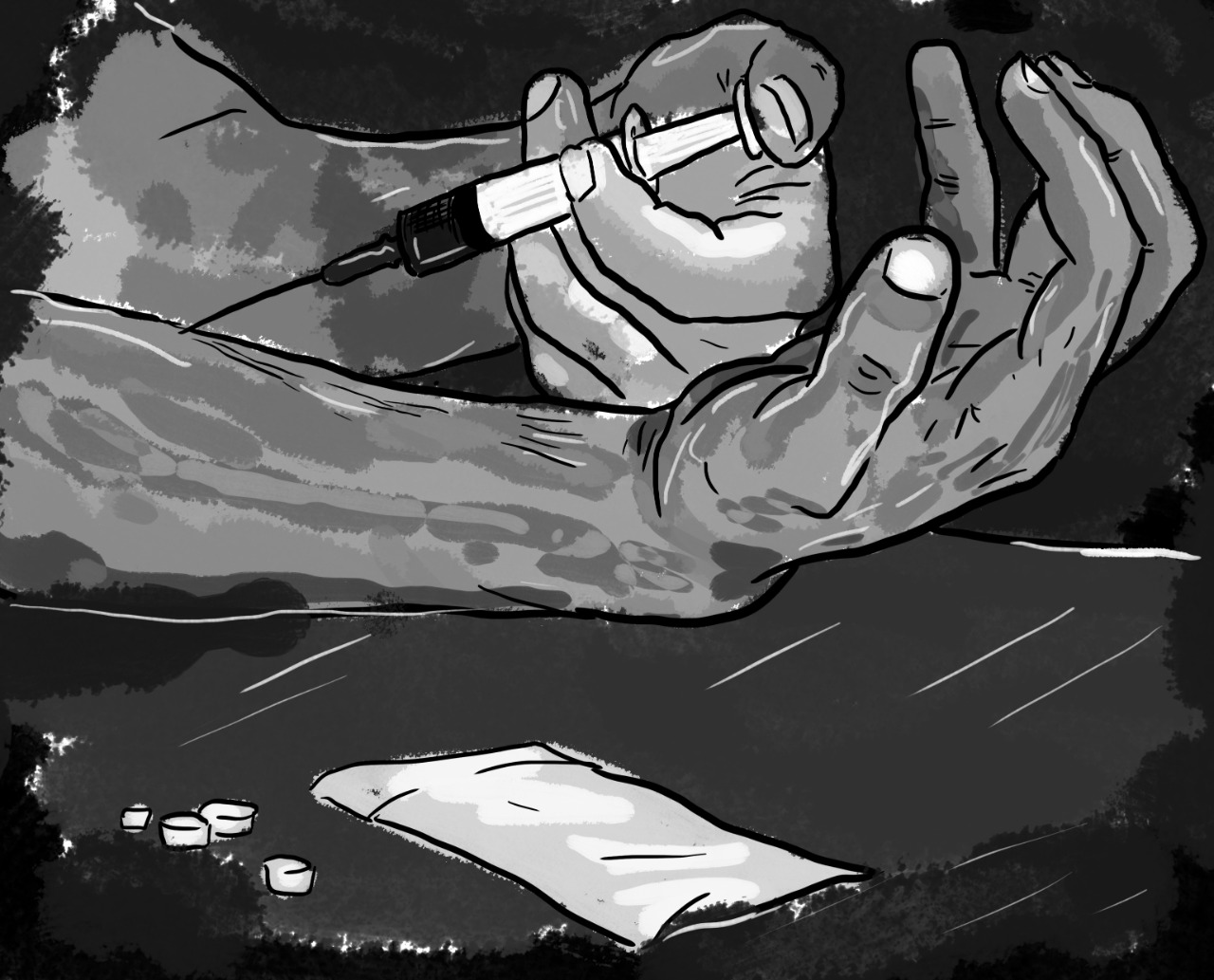
We must actively participate in social revolutions and uprisings. Staying in the room and watching TV and obsessed with business information cannot change our lives. We need to take action. Staying in the room doesn’t change much.
It is obvious from the lyrics that you must be active and you cannot be a passive participant in the revolution. When the revolution happens, you must be on the street. If you want to make a change in society, you have to lift your ass, you can’t sit on the sofa and watch TV.
Key significance: exhortation, satire consumerism, the revolution has begun

second paragraph
According to Gilscott Herron, the revolution will not be decided by the government or the company. To illustrate this point, he laughed at various government officials: “The revolution will not show you Nixon’s photos / blow the horn and lead John Mitchell, General Abrams and Spiro Agnew to eat / Pork belly confiscated from Harlem Reserve.
Scott-Heron’s satire not only adds entertainment value, but also makes subversion “buried in humor” (Smith). As Saul Alinsky wrote about the rules of radicals, “ridicule is the most powerful weapon of mankind”-a concept that Scott Herron seems to understand and act upon.
Key message: a mockery of white government

Third paragraph
Kurt Herron gave us that “revolution will not be televised” and remains the most shrewd criticism of the disengagement and disengagement characteristics of broadcast news—and the crisis of commercialism.
In his “Socially Conscious Iconic Song”, he “contrasts the cultural awakening of the civil rights era with American consumerism” in a poem that “takes the form of a list of things Herron hates: A mediocre icon of white culture and a disgusting politician, it dominated American television in the 1970s.”
Key message: The cultural awakening is contrasted with American consumerism, the mediocre idols of white culture and the disgusting politicians.

Fourth paragraph
Push the shopping cart down the block
Or try to slide a color TV into a photo of a stolen ambulance.
This refers to the TV network predicting the winner of the presidential election shortly after the voting ends at 8pm. The cultural awareness of the civil rights era contrasts with the American consumerism. “Contract”, people are more concerned about entertainment than political numbness and serious political life. Under the background, entertainment media is out of touch with real life information.
The mediocre idol that satirizes the white culture, despises despies mediocre idol, and people are numb to politics
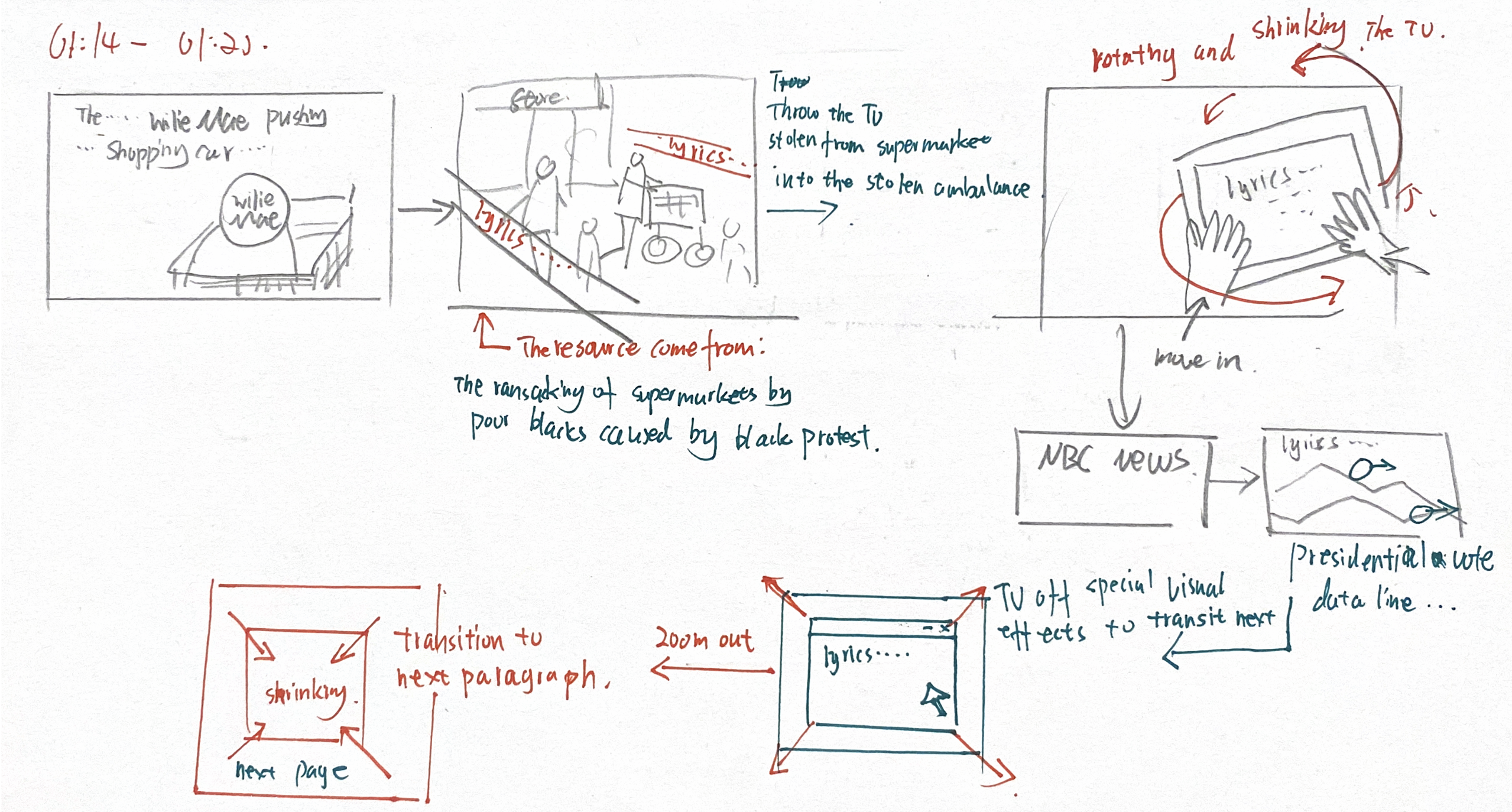
Fifth paragraph

This paragraph mentioned the leader of the black human rights movement and mentioned the fan-Africa flag. So I think the theme color of this paragraph should be black, green and red to set off the positivity of black human rights leaders.
Roy Wilkens: During his tenure, the National Association of Colored People played a pivotal role in leading the nation’s entry into the civil rights movement, and led efforts to lead to significant civil rights victories, including Brown v. Board of Education, the Civil Rights Act of 1964 and Voting Rights The 1965 Act.
Whitney Young: He has spent most of his career working at the end of employment discrimination and rotation in the United States. The National League of Cities has gone from a relatively passive civil rights organization to an active job fair access to socio-economic opportunities, historically deprived of rights.
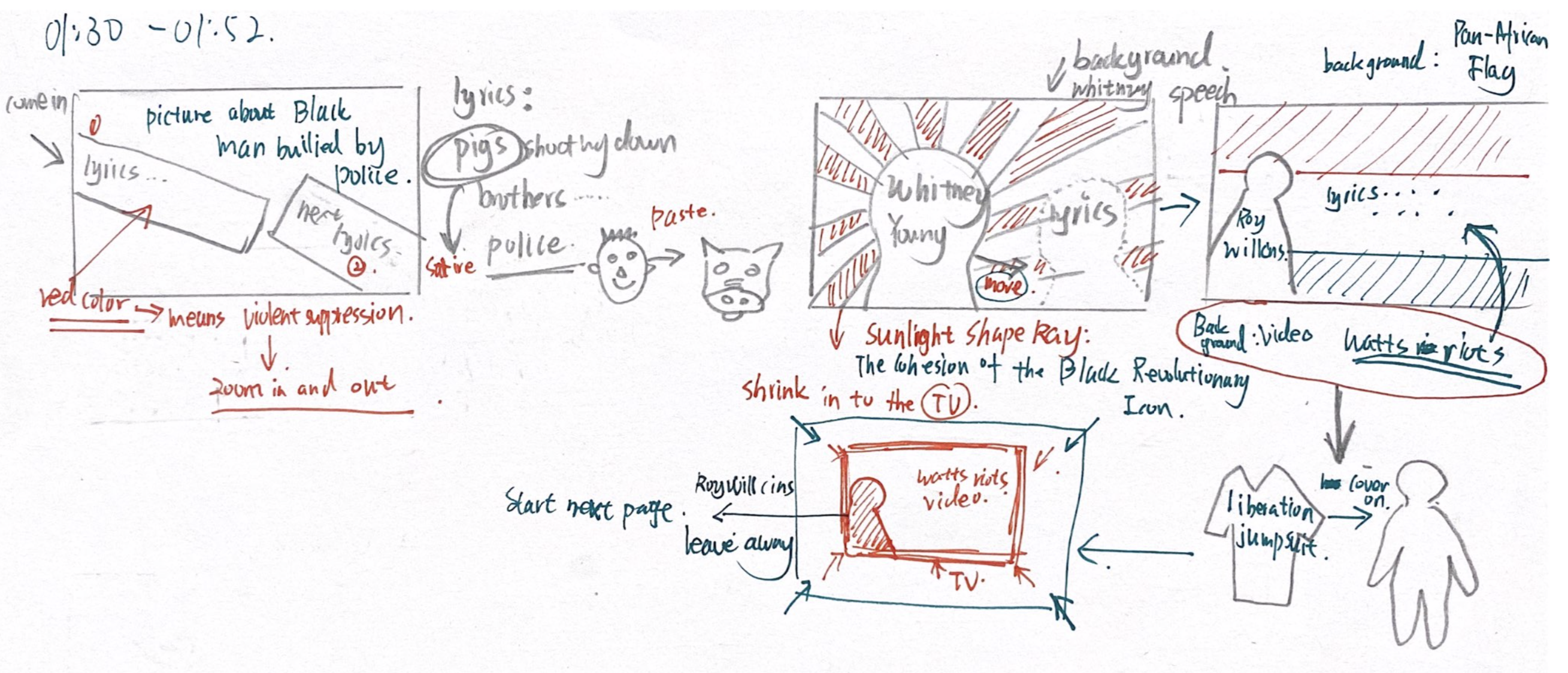
sixth paragraph
“On “Search for Tomorrow”
Because black people will be in the street looking for a brighter day”
In August 1962, the show created the first daytime television contract role for African Americans, thus making history.
Condemn the popular TV show at the time
Reflecting black anger and desire for equality
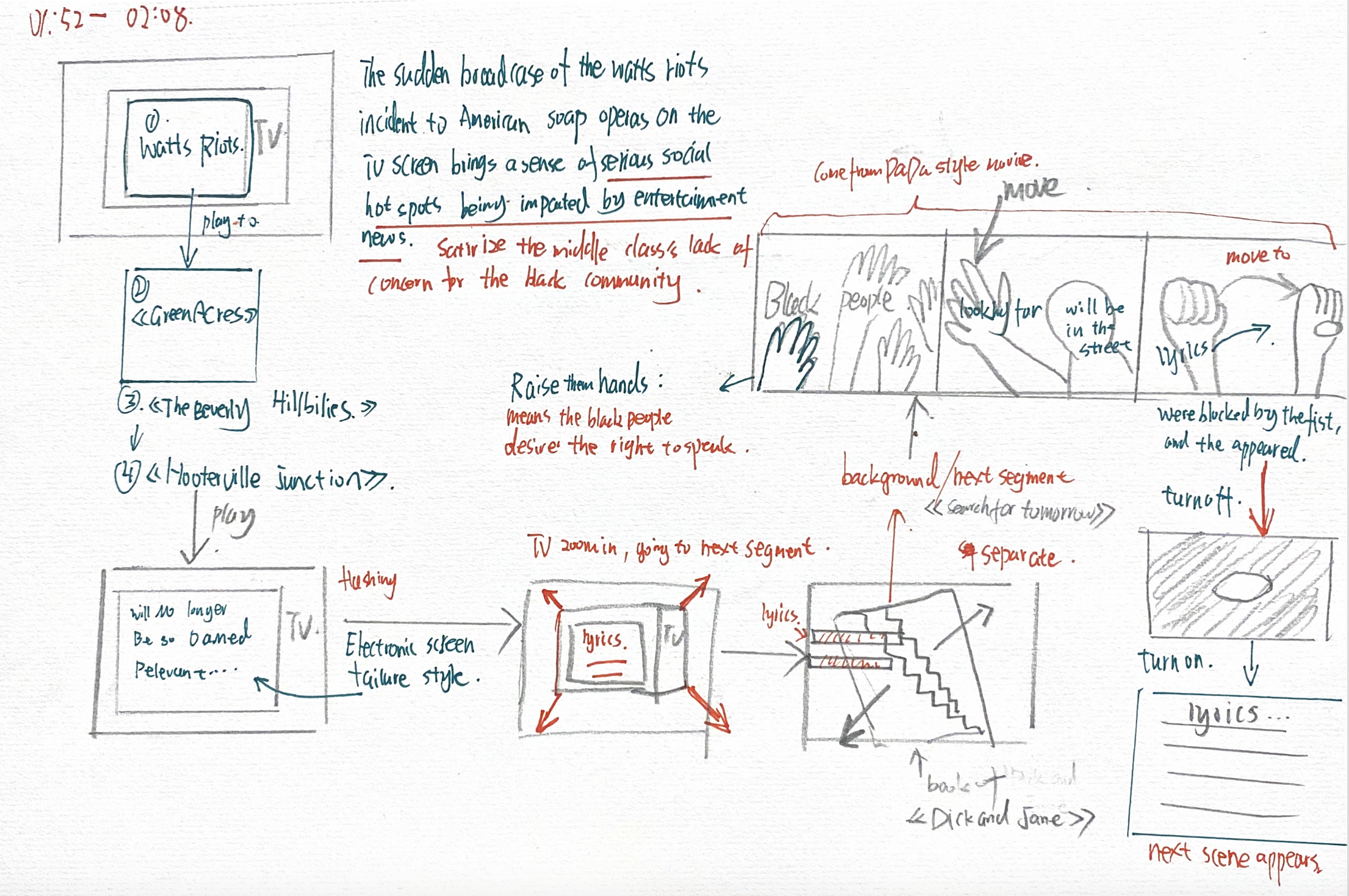
seven paragraph
News will not have bright spots:
the government will not report on serious topics related to revolutionary human rights, but will use media tools such as entertainment and soap operas to cover up social problems.
Furry photos of armed women:
The second wave of feminism expanded the debate to include broader issues: gender, family, employment, reproductive rights, de facto inequality, and official legal inequality. This is a campaign focused on criticize the patriarchy or male-dominated system and cultural customs of the entire society
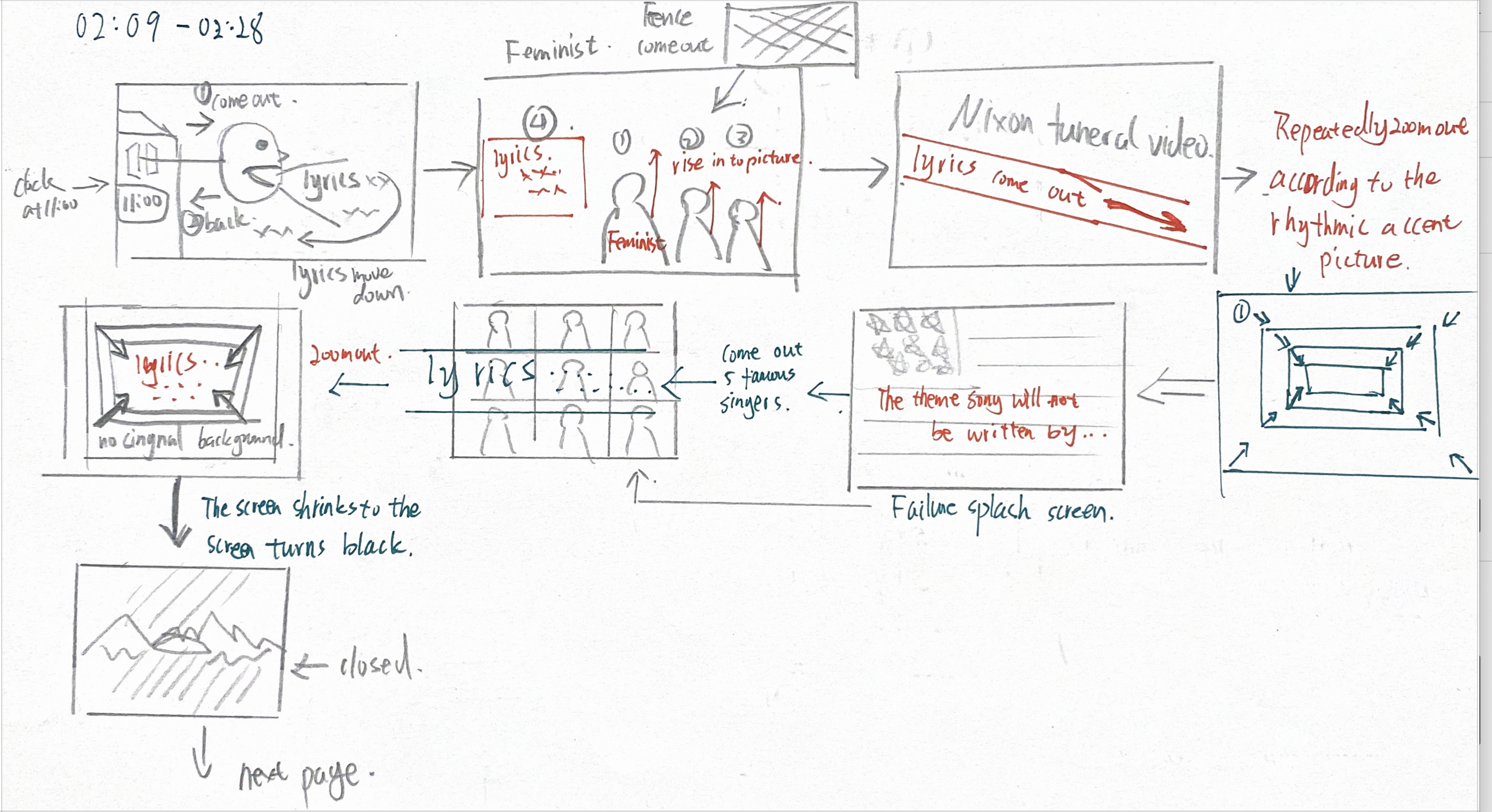
eighth paragraph
Condemnation of the dominant white culture at the time: Scott-Heron emphasized that “the revolution will not return immediately after receiving news about white tornadoes, white lightning, or white people‘’.
The advertising slogans of Sterling, Hertz, Dorf, and ExxonMobil. These brands are the totems of consumer culture in the 1950s and 1960s. They infuse themselves into American myths and folklore.
Criticized the disengagement and disengagement characteristics of broadcast news-and the crisis of commercialism. Distrust of white monopoly capitalism.
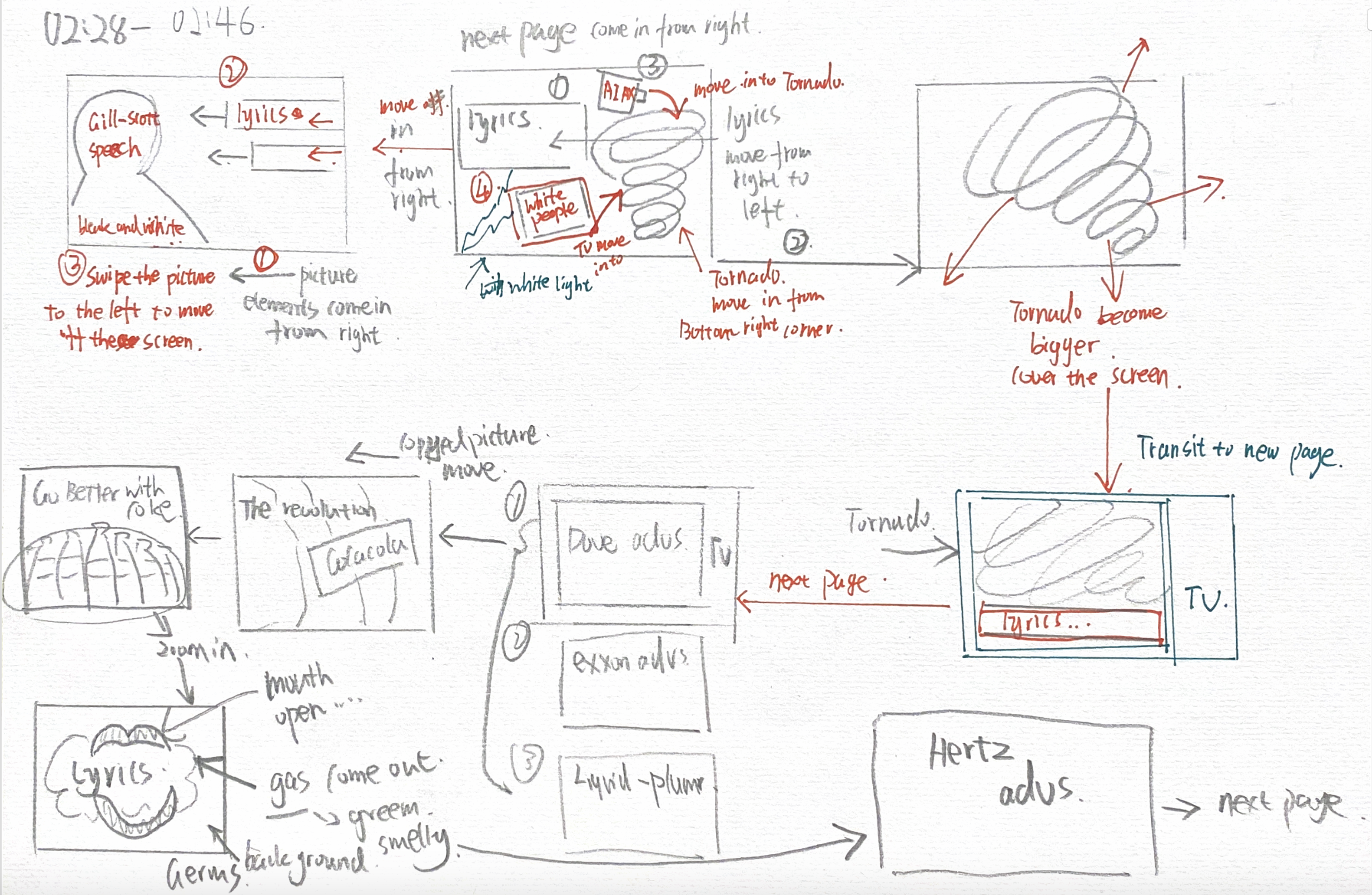
The end paragraph
“The revolution will not be televised
Will not be televised
Will not be televised
Will not be televised”
The report kept emphasizing a slogan like signal, and Jill Scott Herron repeated the title of the song throughout the song-“Revolution will not be broadcast on TV.” Although many of his allusions are condemnation, as Scott-Heron explained in the interview, this sentence captures the message of the song: “Before changing your lifestyle and behavior, you must first change your mind… …Changing people is something that no one can capture in a movie. It’s just something you see, and suddenly you realize,’I’m on the wrong page‘”
“The revolution will be no re-run, brothers
The revolution will be live”
现场:是行动中获得的改变,不是在媒体中看到的东西。
On-site: It is the change obtained in the action, not the thing seen in the media.
The meaning of this text: Encourage black people to take action, revolution is taking place.
